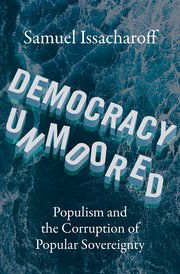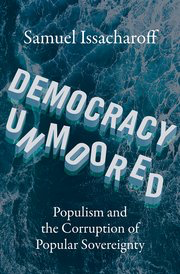Samuel Issacharoff; Democracy Unmoored: Populism and the Corruption of Popular Sovereignty


Samuel Issacharoff, Democracy Unmoored: Populism and the Corruption of Popular Sovereignty (OUP 2023)
The introduction to Samuel Issacharoff’s new book on the rise of populism, Democracy Unmoored, leaves little doubt about the depth of anxiety that current governmental trends around the world produce within the author’s breast. He ponders: How much power can an executive be granted in a legitimately democratic regime? Is there a limit to the largess that can be distributed by an incumbent government during the run-up to an election? Is nearly constant direct communication between a head of government and an electorate via television or social media, an abuse of power? Is legislative activity a safer bet for citizens than executive power? Does a populist movement always require a “strong man” to get it going…and eventually to pull all the strings? Are comparisons between elected populist leaders with such earlier tyrants as Hitler and Stalin inapt? These are all good questions. But when Issacharoff frets about the danger to minorities that might accompany the ditching of what many would consider the wildly undemocratic U.S. Senate Filibuster rule (p. 8), or suggests that in 2016 both Donald Trump and Bernie Sanders managed to convince numerous supporters that, because American elections are a “failed elite endeavor,” they pose dangers for the working class (p. 7), one may wonder about the precise focus of Issacharoff’s apprehensions.
The huge family of new books focused on democracy’s recent or imminent expiry around the world contain a number of genera. Democracy Unmoored quickly settles itself within the literature where much of the blame is placed on economic stagnation and administrative inefficiency. Issacharoff shows that over the past several decades the economies of democratic polities have not grown at the pace that those of authoritarian countries like China or Singapore have. He also voices distress at the fact that neither Britain nor the U.S. seems capable of quickly building an attractive, operational airport. Indeed, he laments, some U.S. government agencies are actually still programming with Fortran! Many older Americans will have previously considered that no contemporary President could replicate Eisenhower’s construction of the Interstate Highway System back in the 1950s, but they may have connected this incapacity with increased avenues of litigation rather than with administration that is so impotent it is no longer acceptable to working-class voters.
It is important to note that the “Failure to Get Things Done” shelf within our “Why Democracy is Foundering” libraries is surrounded by other sections containing works that espouse quite different explanations for the ascent of populism. Furthermore, this “Failure” shelf is itself divisible into several subcategories based on their differing proposed remedies. For example, while Issacharoff takes increased executive power to be a dangerous symptom of a turn toward caudillo-style strong men, other observers, like William Howell and Terry Moe, who join Issacharoff in holding that it is basic failures of public administration that are most responsible for current dissatisfaction with democracy (rather than, say, forms of racism or xenophobia not requiring the appearance of disagreeable airports), argue instead that it is only significant increases in the capacity of government heads to accomplish things efficiently that can provide any hope for the retention of sustainable democracies. It is interesting to contrast Issacharoff’s landing place among this panoply of available analytical options with the Howell/Moe position, not only because the latter scholars prescribe a stronger executive that is less encumbered by constitutional maze-running, but because they hold that the current version of American populism is “dedicated to retrenchment and getting the government out of people’s lives.” They add, in fact, that, “aside from programs that get tough on immigration, what the Republicans mainly have to offer working-class whites is provocative rhetoric—demonization, fearmongering, racism, and saber rattling.” (Presidents, Populism, and the Crisis of Democracy, p. 212) So perhaps the only thing that supporters of right-wing populism really want governments to accomplish is to wall off potential immigrants. Those voters may believe that governments just need to stay out of the way of airport builders.
Along with fellow New York academics Nadia Urbinati and Richard Pildes, Issacharoff attributes much of democracy’s recent decline to the severe enervation of political parties over the past 50 years. Certainly, the feebleness of parties is now frequently named by those looking for causes of the rise of U.S. populism, but the discussion of that subject in Democracy Unmoored is original and insightful. It is supported by considerable data, and its explanation of the ineliminable importance of parties to the coherent, long-term coordination of policy ideas is valuable. In addition, Issacharoff provides an ingenious, Coaseian explanation for what has gone wrong. He likens parties to firms and applies the same sort of externalities-focused analysis that the Nobel winning, libertarian hero did in his 1960 paper on economic deal-brokering. It’s an intriguing approach, and one that Issacharoff also applies to labor unions and broad-based business organizations. I think, though, that there are a couple of gaps in his analysis. First, some of the evidence used to support the theory is quite old and may not be applicable in today’s political environment. For example, the only studies cited in support of the controversial anti-proportionality claim that “Even in our current polarized era where the centers of the two main parties have pulled apart, the ideological distance between the parties tends to be less than in the more fractured preferences of parties operating in proportional representations systems,” (p. 66) date from 1941 and 2001. Second, (and relatedly), Issacharoff’s Coase analogy relies in part on Downs’ (1957) median voter theorem, an idea which has been subjected to compelling criticism of late, notably in Lee Drutman’s Doom Loop book. In addition, Issacharoff’s “hydraulic” metaphor regarding money in politics suggests that effective political finance regulation is impossible. It is thus unsurprising that he seems stymied by Fukuyama’s remark that, while “interest groups are corrupting democracy…they are necessary conditions for a healthy democracy.” (p. 106)
Nevertheless, the material on what might be called “the Four ‘Ps’ of Parties” (i.e., Patronage, Payola, Primaries, and the Progressives) is essential reading for students of populist insurgency. It’s my view that powerful parties—however crucial they may be to good governance—are as difficult to make consistent with majoritarian democratic principles as meaningful federalism has always been, which is why the Progressive movement tended to be anti-party and pro-direct democracy. But in any case, Issacharoff leaves little doubt of the precipitous decline in party identification among average voters in the U.S. and Britain over the last half-century and the effect it has had on public policy. He notes, for example, that in 1950, 20% of British citizens were members of a party, but by 2014, only 1% were. And, of course, before any major party in Britain was backing Brexit, a majority of the electorate did.
The middle chapters of the book are animated by the now perhaps obligatory recitation of recent atrocities perpetrated by populist heads of state around the world. Using Trump as his prime example, numerous blatant lies, attempts to evade institutional oversight, examples of corruption, attacks on the media and courts, and episodes of self-aggrandizement and childish bellicosity are ticked off in the usual lively colors. If there is a difference in Issacharoff’s telling of this depressing story, it may be in his transparent appreciation for conservative anti-democrats like Schumpeter and Burke. Perhaps the most revealing remarks in the book involve his suggestion that Argentina’s broadening of the franchise to include 16-year-olds and resident aliens should be considered with the same disdain as gerrymandering or calling off an election (p. 122). Those comments seem to me to demonstrate that it isn’t so much democracy’s deterioration that troubles Issacharoff as it is any arguably radical (i.e., “untimely”) push for changes to existing election mechanisms—even where prevailing schemes are blatantly anti-majoritarian. One wonders what he would have written about a sudden enfranchisement of blacks or women in a jurisdiction where the change might have helped keep an incumbent regime in power. Is it really his view that legitimate alterations of electoral schemes must resemble the courageous 2010 Columbian court decision that made third terms in office illegal? Was the 2017 Bolivian high court opinion allowing for additional terms necessarily destructive of democracy because it made matters easier for incumbents who want to remain in office? Does “democratic integrity” really mean nothing more than resolute retention of all electoral provisions that might benefit parties currently not in government—however undemocratic those provisions happen to be? To be fair, Issacharoff did spend some time defending his preference for pragmatic jurisprudence against rationalist objections of this kind in his earlier book, Fragile Democracies (especially in the section on the Thai Constitutional Court). But readers should not expect to find anything of that kind within the pages of Democracy Unmoored.
While dismissive of Rousseauvian progressives and their talk of “popular wills,” Issacharoff is tolerant of traditional liberal heroes who have engaged in practices he is quick to criticize when conducted by the likes of a Chavez or Trump. For example, he finds both Franklin Roosevelt’s “fireside chats” (p. 87) and Nelson Mandela’s identification of himself with “the people” (p. 94) congenial. There is, however, one unmistakable populist “tell” according to Issacharoff. He agrees with Jan-Werner Muller that it can be found in an activity’s likelihood of destroying the long-term potential for future peaceful transfers of power, what Issacharoff calls “repeat play.” It is the weakening or loss of such guardrails that causes democracy to become unmoored. Following Dicey, Issacharoff takes the most important repeat-play institutions to be held in place by unwritten and perhaps legally unenforceable principles, but he confusingly likens those supports to the rule prescribing the number of strikes to which a baseball player is entitled at any turn at bat (p. 85). While it is no doubt true that the latter directive, like various democracy stanchions, cannot sensibly be questioned during its use, the baseball rule has been formally promulgated, so no inference regarding “unwritteness” can properly be made. It thus might have been better to have pointed to something like a willingness to abide by duly promulgated MLB standards.
Issacharoff is concerned to distinguish newer populist nations from such tyrannical regimes as Hitler’s Germany. He writes, “The emergence of elected autocrats challenges inherited legal categories. The world no longer turns on easy binaries such as democratic or not” (p. 110) And he makes current disinterest in wholesale constitutional changes one feature that distinguishes the two sets. But which group should be congratulated? Surely, retaining a facade of concern about constitutionality in spite of both law and fact is likely to make an administration look good, even if it may complicate the work of courts and scholars. And in a country like the U.S. in which the Constitution is believed by many (perhaps Issacharoff included) to be a divinely inspired document, it is bound to be beneficial to incumbents to insist that it is really the other guys who are the infidels—especially when the media has little power to effectively rebut such lies. Although most of the stories about attempts at election subversion in the U.S. mentioned in the book will be familiar to viewers of CNN or MSNBC, Issacharoff does an excellent job calling out partisan (and, sadly, sometimes successful) attempts to eliminate all vestiges of independent election supervision, both in the U.S. and around the world. Those who exalt democracy will surely agree with him that elections must be held strictly aloof from partisan interests. But Isaacharoff improperly extends this requirement of non-partisanship to other sorts of bureaucratic management, repeatedly citing alleged failures in U.S. public health administration during the height of the COVID pandemic (pp. 171-181). The problem with such enlargement is that any claims about the superiority of civil service to political patronage (or vice-versa) should be understood to themselves be forms of party politicking, a fact one might divine from Trollope’s Three Clerks or the BBC’s Yes, Minister. The failure to strictly separate democracy-enforcing rules from other kinds of governmental ideals—even those seen as solidly scientific ones—will surely invite reasonable dissent both from the right and the left. Yes, ingesting either hydroxychloroquine or Clorox bleach is useless against COVID, but the appropriate conclusion to reach from such nonsense is that Trump is a buffoon who was utterly unqualified for public office, not that no executive should have the power to replace all of their agency heads—if that’s what some electoral mandate really calls for.
It is not hard to infer most of the reforms eventually presented here from the material in the earlier chapters. Some involve getting more money and power into the hands of political parties and the memorialization of opposition party rights. Naturally, Issacharoff also endorses the independence of courts and commissions. A plea is made for immigration reforms and additional border security: these are necessary, it’s claimed, in any nation that is “overrun with foreigners” (p. 193). Issacharoff is not sold on parliamentarism or increased federalism as preventions or cures for either caudillo states or ineffectual ones, and he is skeptical of sortition. But he does endorse such “small bore” reforms as experimenting with the elimination of party primaries. Finally, he expresses a somewhat pious hope for the education of a more virtuous, enlightened citizenry, one that will share common goals and eschew partisan bile (pp. 204-207). Issacharoff doesn’t seem overly sanguine about much of this: in the end, he seems to be hunkering down with the rest of us pessimists in our various domains of despair. He does, however, find a glimmer of hope in the fact that war-ravaged Ukraine is somehow managing to retain its democratic bona fides. Perhaps even the gloomiest of us will join him in that salute.

About the Author
Walter Horn is a philosopher of politics and epistemology.
His 3:16 interview is here.